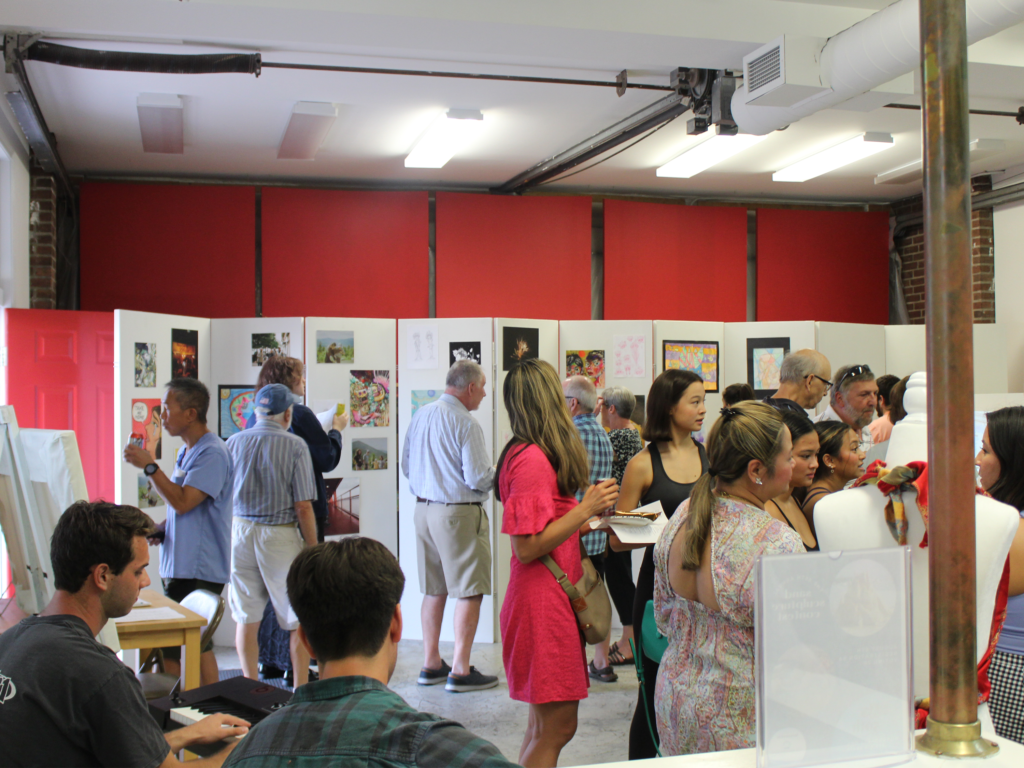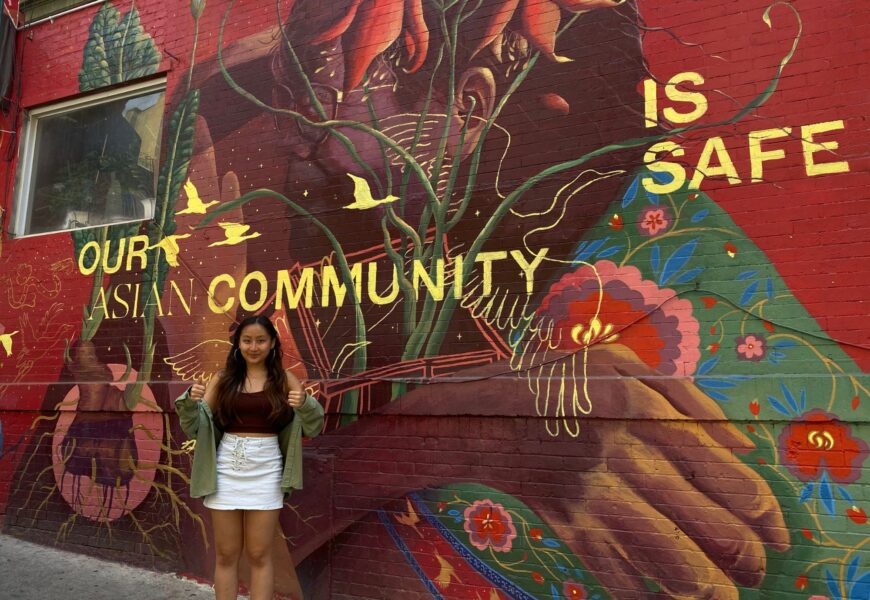Courtesy of Charmaine Chau ’24
Note: This article has been edited upon request.
To kick off Asian American Pacific Islander (AAPI) Heritage Month earlier this year, two juniors began their prestigious fellowship projects centered around Asian American art and culture. Charmaine Chau ‘24 was awarded $5,000 from the Minor Myers Jr Research Fellowship to travel to Chinatowns across America and film a documentary exploring the relationship between street art murals and Asian American representation. Olivia Loo ‘24 won $10,000 from the Davis Projects for Peace Fellowship to develop community-based programming, including an AAPI student art gallery in her home- town and a children’s book she plans to self-publish.
Chau is no stranger to creating unique educational opportunities: she is a self-created Fashion Design major and Art and Education minor. She knew she wanted to apply for the Myers Fellowship to combine her interests in art, filmmaking, and travel. Chau was inspired by murals in Boston, having painted murals herself in high school and produced large format paintings in her art courses (some of which were featured in Loo’s art gallery), but it wasn’t until Loo suggested she combine her Asian identity with mural-making to personalize her research.
“I wanted to explore art, specifically murals, but also if there is good Asian representation, how is it represented?” Chau says. She traveled to Chinatowns in Boston, New York, Philadelphia, and San Francisco and compiled a collage of artist commentaries, local testimonies, and sweeping visuals of colorful murals. While she did not include her own reactions to the murals in her documentary, she recalls a favorite that resonated with her: Jess X Snow’s 2021 Manhattan mural “In The Future Our Asian Community is Safe,” which features an elderly Asian woman embracing a younger woman with flowers unfurling across a red background. Chau studied Snow’s work at Conn and was excited to see their work in real life.
Growing up in rural New Hampshire with immigrant parents, Chau says that she and her brother were some of the few people of color in school. Going to Conn was the first time she was surrounded by other Chinese and Asian students. Chau also stated that being able to communicate with professors in Cantonese was an emotional experience. She wrote in her Fellowship proposal that her FYS “Chinese Art Comes To America” and her Chinese class were the first times she had POC professors: Yibing Huang, her adviser, and Tek wah King. With their encouragement and support, she plans to show her work in the Charles Chu Asian Art Reading Room, a fitting setting for her research.
Being immersed in Conn’s Asian community also opened her eyes to past interactions with school friends in New Hampshire. “There were a lot of instances I look back on like, okay, that was lowkey racist and that’s not ok, or that was a microaggression, but I didn’t even know that stuff was bad until going to college,” she says about her upbringing. “I would talk to Olivia about this stuff, [and that] helped me realize that that’s not ok. Moving forward, I want to teach my kids [to] embrace their culture.”
Loo recalls the rise in anti-Asian hate crimes when she and Chau matriculated in 2020. In response to the racial reckoning across the nation, she educated herself as much as possible about diversity, equity, and inclusion. In true Connections curriculum fashion, she took Anthropology, Sociology, Education, Asian American studies, and Critical Race Theory courses before declaring a double major in Sociology and Economics. She spoke to then Dean of Institutional Equity and Inclusion John McKnight about the lack of coverage of the increased violence in mainstream media and her desire for more conversation. This sparked an interest in diversity, equity, and inclusion and inspired her Davis Projects for Peace proposal.
She wanted to focus on early education about Asian American history. “What would younger Olivia want to have learned, heard, [or] be equipped with?” she asked herself. “It’s basically the knowledge of how U.S. immigration policy connects to anti-Asian sentiment. It’s the hatefulness and all the violence that has occurred towards Asian populations and the elderly population specifically because of the pandemic.”
With this in mind, she wrote a children’s book unpacking Asian American history and racial triangulation theory — a concept exploring how Asian people and the “model minority” stereotype relate to the Black-White racial dichotomy — in an age-appropriate format. With illustrations from Jazmyn Gillespie ‘24, she plans on using the Fellowship funding to eventually publish and distribute her book, but she focused on establishing long-lasting community programming this summer. She led a series of library events for children, including art-making events celebrating cultural food “challenging and embracing the lunchbox moment,” a common microaggression among Asian Americans when their homemade food is judged for being different from typical American fare.

Courtesy of Olivia Loo ’24
Her work culminated in hosting an art gallery exhibition in her hometown on August 5, featuring art by AAPI student artists, including many from Conn, and children’s artwork from her library events. The exhibition title, “Who We Are and Oh, the Places We’ll Go,” is “a specific reference, fervent critique, and reclamation of harmful racist representations produced by Dr. Seuss,” Loo writes in the program. She hopes that the art on display can create a celebratory space for young Asian American artists and spark discussions about updating school curriculums to acknowledge BIPOC contributions and experiences. “I want the gallery to be a segue into conversations about impactful change and sustainable change,” Loo says. “When history is taught in the classrooms, how do we ensure that it is representative of all people, not only just the AAPI community, but of all individuals?”
Chau and Loo will continue their work with events in the fall semester and hope to use their fellowship experiences as a foundation for future AAPI-focused programming and activism.










